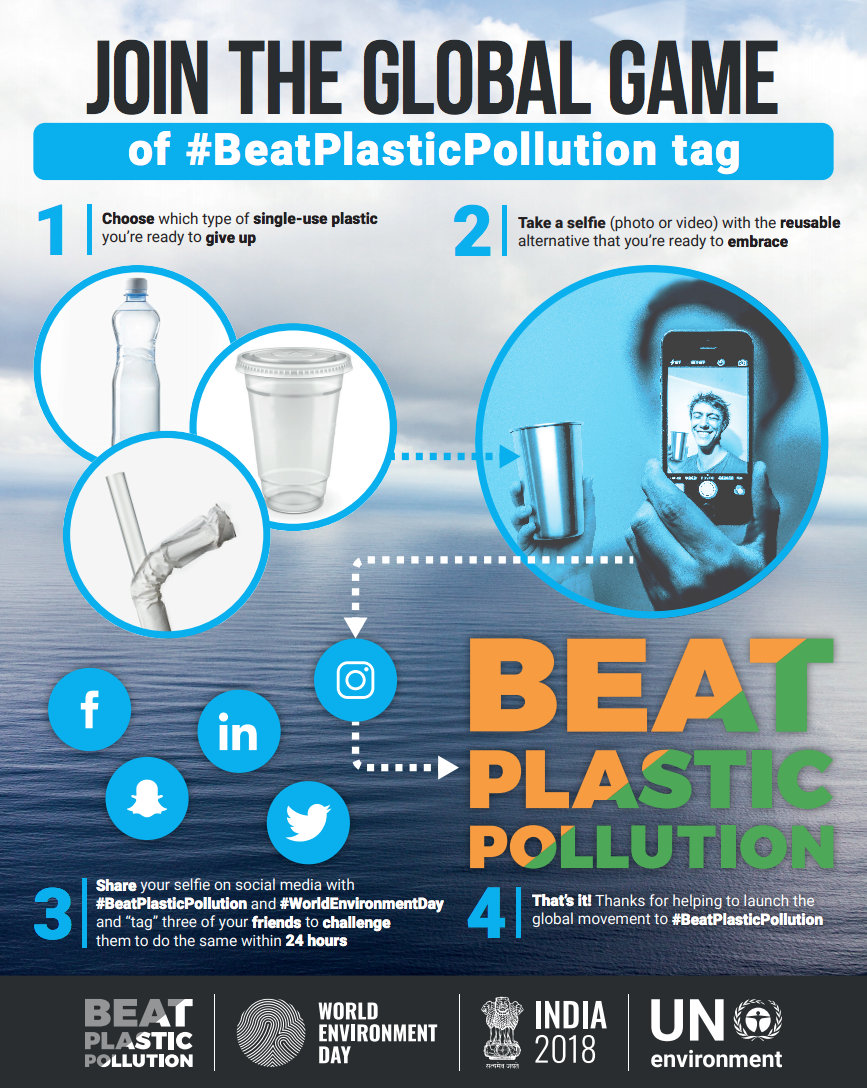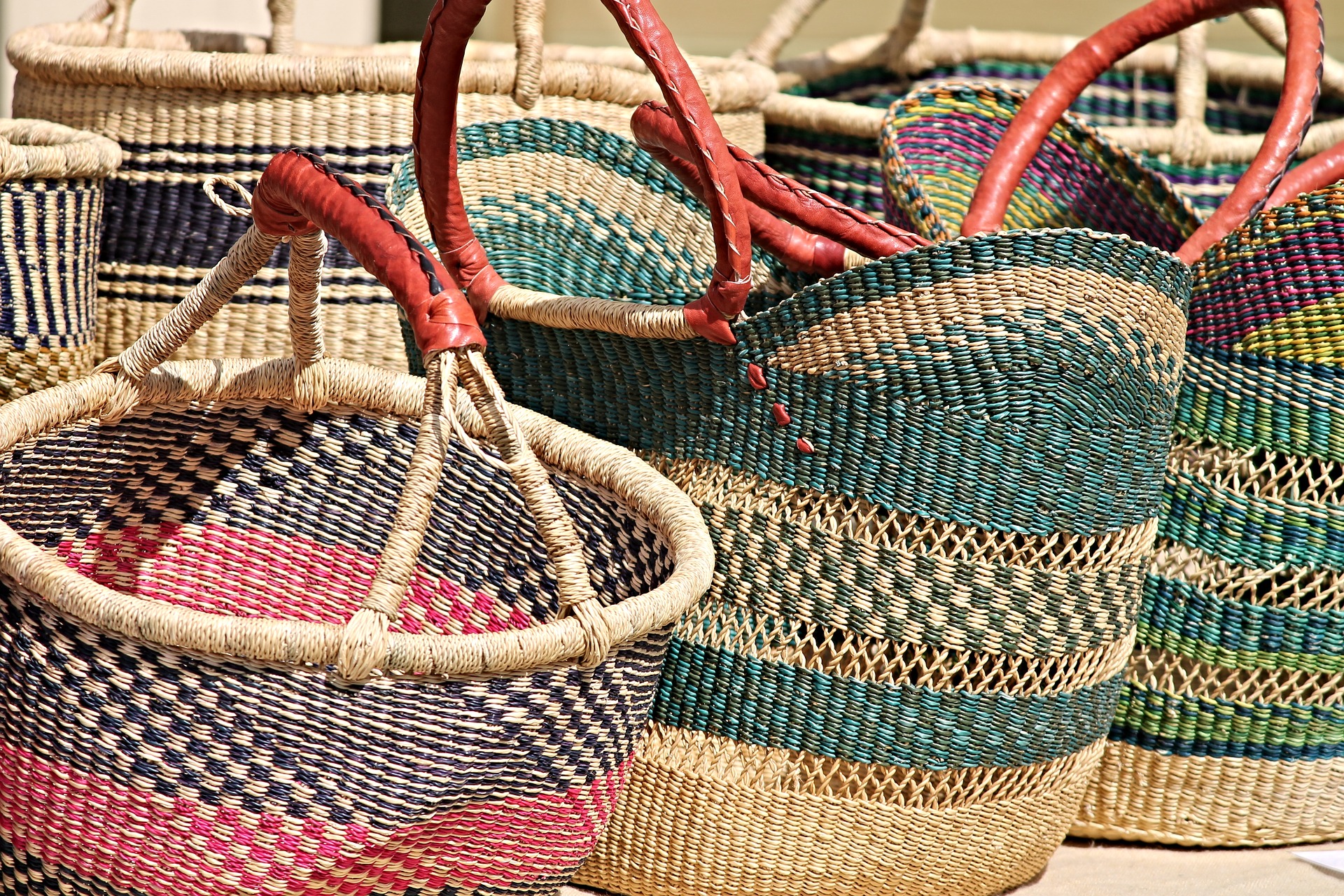June 5 is World Environment Day. This year the focus is on what each one of us can do to reduce plastic waste. Half of all the plastic we produce is single-use or disposable. Bottles are the most common type of plastic waste. Worldwide we buy 1 million plastic bottles every minute and less than 50% are recycled. Even more – close to 2 million – single-use plastic bags are distributed worldwide every minute.
There are many things we can do to help reduce the amount of plastic that ends up in the waterways, landfills, and on the ground. Start by playing plastic pollution tag. Here’s how you do it:
- Choose a single-use plastic item that you are ready to give up.
- Take a selfie with a reusable alternative you’re going to use in its place.
- Share that selfie on social media. Use the hashtags #BeatPlasticPollution and #WorldEnvironmentDay. Tag three friends and challenge them to do the same within 24 hours.

Reusable containers are a great way to reduce your use of plastics, but remember, whenever you reuse a bag, container or any item, it is EXTREMELY IMPORTANT to wash and dry the item thoroughly to reduce the risk of mold, bacteria, cross-contamination, and a host of other potential problems. For example, refillable mugs are great, but if you never wash the mug you are probably growing things you don’t want to drink in the mug. Same thing with reusable grocery & produce bags and straws. Work with your favorite stores and restaurants to learn if there are health regulations in your area that make it more challenging to use your own containers. No one wants you to get sick from a contaminated container.
Sustain your commitment to reduce your use of plastic by making one change each week. Your decisions will help you save money and reduce the clutter in your home.
52 things you can do to reduce your plastic use:
- Take a reusable shopping bag whenever and wherever you go shopping. Remember these should be washed and dried after each use. If you don’t have a bag then choose paper over plastic.
- Drink tap water and stop buying water in plastic containers.
- Use matches instead of disposable plastic lighters, or invest in a refillable metal lighter.
- Store leftovers in reusable food containers instead of using plastic wrap or disposable plastic containers.
- Stop using plastic straws. Ask for less ice in your drinks so you can drink them without a straw and without spilling the drink down the front of your shirt.
- Take your reusable beverage container to coffee shops. Don’t forget to thoroughly wash and dry the container after each use.
- Choose ice cream in a cone rather than a cup.
- Invest in a reusable produce bag to replace those plastic bags at the grocery store. Remember to wash and dry the bag after each use.
- Read the ingredients on your face cleaner and toothpaste and look for polyethylene and polypropylene microbeads. If your favorite product contains them, switch to a new toothpaste and face cleaner. Several companies have already committed to removing microbeads from their products.
- Replace the disposable plastic razor with one that has a replaceable blade.
- Make your household cleaning products. This reduces the need to buy plastic bottles of cleaners. Try the UGA Extension Green Cleaning recipes.
- Select food and household cleaning products packaged in cardboard.
- Buy a bamboo toothbrush instead of one with a plastic handle. An estimated 1 billion plastic handled toothbrushes are tossed out each year.
- Make fresh squeezed juice.
- Don’t buy single serving sizes.
- Buy food and spices in bulk.
- Pack your lunch in reusable containers.
- Avoid buying frozen foods because their packaging is mostly plastic. Even those that appear to be cardboard are coated in a thin layer of plastic. Plus you’ll be eating fewer processed foods!
- Encourage your favorite takeout restaurants to switch to non-plastic containers and eating utensils.
- Switch to plastic free chewing gum. Did you know gum contains synthetic rubber?
- Switch from disposable diapers to cloth. The EPA estimates that 7.6 billion pounds of disposable diapers are discarded in the US each year.
- Purchase used or secondhand items from thrift stores, Craigslist, Freecycle, Swap meets, etc.
- Replace liquid soap with bar soap.
- Cook more of your meals from scratch. This will help reduce the need to purchase a lot of pre-made and restaurant food.
- Go digital. No need to buy CDs or DVDs.
- Use rechargeable batteries to reduce waste and avoid buying batteries packaged in plastic.
- Select wood toys over plastic toys for children.
- Instead of buying air fresheners, make your own. A bowl of white vinegar is a great way to remove odors. To freshen the air try bouquets of fresh herbs or a pan of boiling water with cinnamon sticks and/or cloves.
- Replace plastic wrap with aluminum foil. Better yet, put the item in a reusable container.
- Return plastic plant pots and containers to the store where you purchased the items. Many nurseries and big box stores reuse them.
- Shop at a local farmer’s market and take your own bags.
- Replace the plastic dish scrubber with a natural fiber brush, copper mesh scrubber, or just rags.
- Select a natural fiber hairbrush with a wood handle.
- Keep a reusable plate, bowl, glass and utensils at work. Be sure to wash your dishes thoroughly after each use.
- Search the thrift stores to find a stainless steel ice cube tray that you can use to make ice cubes as well as popsicles.
- Instead of buying new tools, see if your community has a tool lending program.
- When items break, repair them.
- Replace the disposable pens in your life with a refillable pen.
- Take headphones on the plane rather than using the disposable ones distributed on the plane.
- Take your own personal care products in refillable containers and leave the travel size products at the hotel. Encourage the hotel to switch to refillable soap containers in the shower and by the sink.
- Select clothing made from natural fibers.
- Use a cloth handkerchief instead of paper.
- Repurpose the plastic containers in your home. For example, a cream cheese tub can be used as a plant saucer.
- Take up gardening and start growing vegetables instead of purchasing the.
- Choose wines with cork stoppers instead of synthetic stoppers.
- Stop using single-use coffee pods.
- Learn how to responsibly dispose of plastics (www.earth911.com)
- Don’t purchase anything with glitter on it, unless it is biodegradable. Most glitter is made from mylar, which is a mircroplastic that could end up in the waterways.
- Stop smoking cigarettes with plastic filters. Better yet, give up smoking all together.
- Stop using disposable wipes, which often contain plastic fibers. These wipes are also clogging sewers and creating giant “fatbergs.”
- Pick up plastic trash you see on the beach or street and dispose of it in the recycling bin.
- Share the message with friends and family.
Each one of us can reduce our use of plastics, which helps influence businesses to make changes like removing microbeads from products and changing packaging. Changing policies is a much bigger challenge, but not impossible. City by city we have seen stores charging for plastic bags, or not using them at all. Restaurants are swapping plastic straws for recyclable ones. There are even zero waste grocery stores popping up.

Leave a Reply